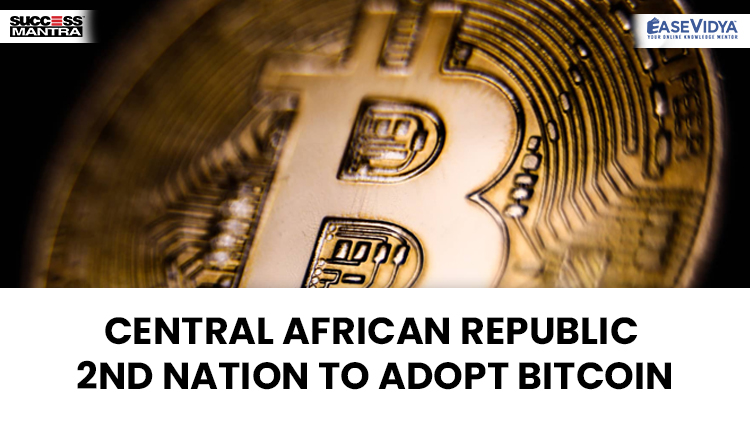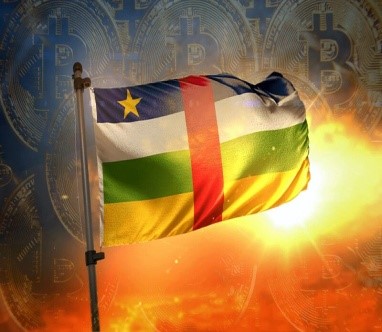
CENTRAL AFRICAN REPUBLIC: 2ND NATION TO ADOPT BITCOIN
CENTRAL AFRICAN REPUBLIC: 2ND NATION TO ADOPT BITCOIN
Recently, the Central African Republic (CAR) became the second country after El Salvador to adopt Bitcoin as legal tender. The Union Budget 2022-2023 of India has also proposed to introduce a digital currency in the coming financial year. It was also announced that “any income from transfer of any virtual digital asset shall be taxed at the rate of 30%."

WHAT ARE THE VIRTUAL CURRENCIES?
There is no globally accepted definition of what exactly is virtual currency. Basically, virtual currency is the larger umbrella term for all forms of non-fiat currency being traded online. Fiat Money is a kind of currency, issued by the government and regulated by a central authority such as a central bank. Such currencies act like legal tender and are not necessarily backed by a physical commodity. Virtual currencies are mostly created, distributed and accepted in local virtual networks. Virtual Currencies also includes cryptocurrencies. Cryptocurrencies have an extra layer of security, in the form of encryption algorithms. Most cryptocurrencies now operate on the blockchain or distributed ledger technology, which allows everyone on the network to keep track of the transactions occurring globally. Popular forms of cryptocurrencies include Bitcoin, Ethereum, etc. Satoshi Nakamoto, widely regarded as the founder of the modern virtual currency bitcoin and the underlying technology called blockchain, defines bitcoins as “a new electronic cash system that’s fully peer-to-peer, with no trusted third party (central regulator)”
Current Affairs Notes By Success Mantra Coaching Institute GTB Nagar Delhi CLICK HERE
LEGITIMACY OF BITCOINS (OR CRYPTOCURRENCY) IN INDIA
In the 2018-19 budget speech, the Finance Minister announced that the government does not consider cryptocurrencies as legal tender and will take all measures to eliminate their use in financing illegitimate activities or as a part of the payment system. In April 2018, Reserve Bank of India (RBI) notified that entities regulated by it should not deal in virtual currencies or provide services for facilitating any person or entity in dealing with or settling virtual currencies. However, the Supreme Court struck down the ban on trading of virtual currencies (VC) in India, which was imposed by the RBI. The Supreme Court has held that cryptocurrencies are in the nature of commodities and hence they cannot be banned.
INDIA'S OWN DIGITAL CURRENCY
Recently, in its Budget 2022-23, the Government of India announced that its central bank will issue a digital currency as early as 2022-23. It is one crucial decision that most major economies are refusing to make in a hurry. The arguments in favor of digital rupee claim that an electronic representation of India’s legal tender will boost its digital economy. However, it is also important to evaluate the risks associated with a hasty transition to a Central Bank Digital Currency (CBDC).
WHAT IS DIGITAL RUPEE?
The Reserve Bank of India (RBI) will issue the digital currency in the next fiscal which will be called Digital Rupee. A central bank digital currency (CBDC) uses an electronic record or digital token to represent the virtual form of a fiat currency of a particular nation (or region). The digital rupee will allow users to transfer purchasing power from deposit accounts into smartphone wallets in the form of online tokens, which like cash will be a liability of the Reserve Bank of India. A digital rupee will be like banknotes, minus ATMs.
EL SALVADOR ADOPTS BITCOIN AS LEGAL TENDER
El Salvador, a small coastal country in Central America has become the first in the world to adopt Bitcoin, as legal tender. Legal tender is the legally recognized money within a given political jurisdiction. Bitcoin is a type of digital currency that enables instant payments to anyone. Bitcoin was introduced in 2009. Bitcoin is based on an open-source protocol and is not issued by any central authority. The origin of Bitcoin is unclear, as is who founded it. A person, or a group of people, who went by the identity of Satoshi Nakamoto are said to have conceptualised an accounting system in the aftermath of the 2008 financial crisis.
Use: Originally, Bitcoin was intended to provide an alternative to fiat money and become a universally accepted medium of exchange directly between two involved parties. Fiat money is a government-issued currency that is not backed by a commodity such as gold. It gives central banks greater control over the economy because they can control how much money is printed. Most modern paper currencies, such as the US dollar and Indian Rupee are fiat currencies.
Acquiring Bitcoins: One can either mine a new Bitcoin if they have the computing capacity, purchase them via exchanges, or acquire them in over-the-counter, person-to-person transactions. Miners are the people who validate a Bitcoin transaction and secure the network with their hardware. The Bitcoin protocol is designed in such a way that new Bitcoins are created at a fixed rate. No developer has the power to manipulate the system to increase their profits. One unique aspect of Bitcoin is that only 21 million units will ever be created. A Bitcoin exchange functions like a bank where a person buys and sells Bitcoins with traditional currency. Depending on the demand and supply, the price of a Bitcoin keeps fluctuating.

REASON BEHIND THE DECISION
- Loss on Remittances: El Salvador relies heavily on money sent back from workers abroad. Bitcoin adoption may make these remittances quicker and cheaper. It is also expected to boost financial inclusion in their country as the majority of the population does not have access to formal banking channels.
- Major Concerns: In the absence of a central regulating authority, legalizing bitcoin will have potential for fraud and money laundering, high energy costs and extreme volatility. This could potentially encourage other smaller countries with weaker economies to open up to crypto as an alternative to fiat currencies, paving the way for mainstream future adoption worldwide. Already, Venezuela and many African countries have started using cryptocurrencies as a long term store of value, as their currencies are deflating quickly.
SOME LESSONS FOR INDIA
- Not an instance for Monetary Policy: El Salvador does not have its own monetary policy, hence, no local currency to protect. It runs on the monetary policy of the US Federal Reserve. Therefore, any changes in Federal Reserve policies will definitely affect the Country. Hence, it is looking at such alternatives. Since, India has its own currency and a central bank, therefore coexistence of bitcoin and rupee side by side becomes difficult.
- Impact on Remittances: The impact Bitcoin has on remittance inflows would be worth monitoring for India, which is home to the largest remittance market in the world. According to a World Bank report, India received over USD 83 billion in remittances in 2020.
- Impact on Money Laundering: The implication of this move for money laundering is unclear at the moment. Currently, El Salvador is not considered deficient under the Financial Action Task Force (FATF) money laundering requirements. However, with large scale cryptocurrency inflows and outflows, it would be expected that El Salvador would comply with the 2019 FATF guidance on Virtual Currencies.

PRAVAHINI Current Affairs Notes By Success Mantra Coaching Institute GTB Nagar Delhi CLICK HERE
TEST YOURSELF
Q.1 Recently, which of the following nations have become the second country after El Salvador to adopt Bitcoin as legal tender?
- Nicaragua
- Puerto Rico
- Dominican Republic
- The Central African Republic (CAR): ANSWER
Q.2 Consider the given options and state which of the following is not one of the forms of crypto-currency?
- Bitcoins
- Ethereum
- Blockchain: ANSWER
- None of the above-mentioned
Q.3 Which of the following statements is/are incorrect in the reference to the above mentioned passage?
- Bitcoin is a payment system released as open-source software in 2009.
- The system is peer-to-peer (P2P); users can transact directly without needing an intermediary.
- Transactions are verified by network nodes and recorded in a public distributed ledger called the block chain.
- None of the above: ANSWER
Q.4 Which of the following is correct regarding the name of the general ledger that tracks all bitcoin transactions?
- The Gox Chain
- Ledger Link
- The Block Chain: ANSWER
- Satoshi Square
Q.5 Which of the following persons have introduced the Bitcoin 'a cryptocurrency' to the whole world?
- Stuart Haber
- Scott Stornetta
- Satoshi Nakamoto: ANSWER
- Dave Bayer












0 Comment